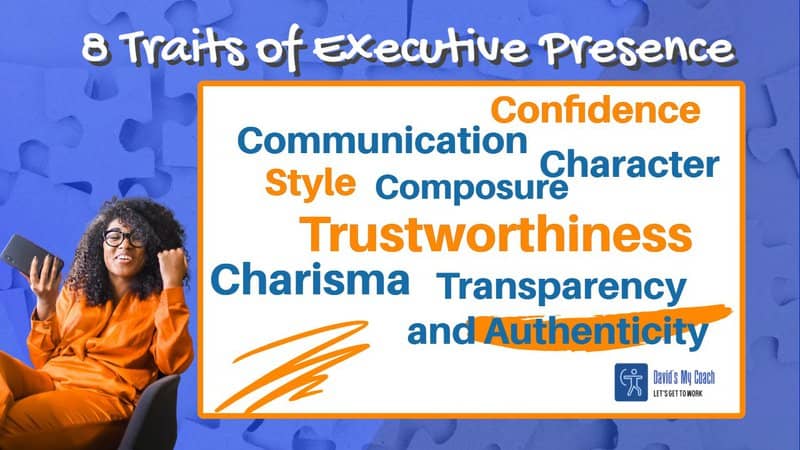
Defining the Executive Presence Pillars
You've been told you need strong Executive Presence skills, right? Or you heard, it's the key to career success, and rising to the highest levels of decision-makers and the c suite. On your personal journey, you'll hear many things about developing strong Executive Presence or commanding a room, and developing leadership skills.

Executive Presence remains one of the most misunderstood terms in business. The definition of Executive Presence, while many stumble to articulate it, is your ability to influence others, create personal impact, and project confidence even when you don't feel confident. Moreover, Executive Presence is having the ability to command the attention of your audience even if you possess quiet confidence or demeanor.
It's not just about how you dress or how well you speak. EP is also about being authentic with yourself and those around you so that they trust your leadership skills.
In this article we will discuss the traits of Executive Presence and why it's essential to navigate company culture and have a successful career.
The 8 Traits and Characteristics of Executive Presence
I've spoken in a previous article about the 8 specific traits of Executive Presence on I Speak Life Coaching.

But don't click away. Here they are for your review:
Confidence
Confidence is essential to Executive Presence. In fact, you must show it in your appearance and how you speak, not just what's said but also through eye contact, posture adjustments at times when making a speech or delivering an oral presentation. These are all factors that contribute to conveying that feeling of impending power which can't be matched by any other quality more easily obtained than talent has its limits sometimes.
Charisma
"What's your greatest strength?" "Charisma." The power of captivation is a big part of Executive Presence. People will be drawn in by the charm and personality you're able to project, which can help influence others for good!
Relatability
The best way to establish your presence is by being relatable. One of the ways you can do this, and get noticed by others too, is through sharing personal experiences with them on an individual level so they realize that we are all human beings just trying our best in life. Your tone should be inspirational without having any toneless areas such as describing work tasks – it's important not only for making connections but also for capturing attention at first glance!
Trustworthiness
To lead others, you must earn their trust. This can be difficult if there are no convictions and inconsistency in your actions; but by being the person other see doing the right thing even when nobody's watching (because someone always is), people will follow suit because they know it’s worth following through with whatever else might happen at that point for themselves as well so long as everyone has integrity.
Transparency and Authenticity
It takes a confident person to be open about their mistakes and own up to having fears. People with Executive Presence aren't ashamed of who they are or what makes them different from other people; instead, the authenticity is refreshing because it forces you into taking an honest look at yourself for once!
Conciseness
You must be able to convey your point in your communication. Clarity and conciseness are key, so you need a clear understanding of what YOU want to communicate as well as how much time people will allow for listening. After all, people don’t typically retain information unless it's brief enough that they pay attention from beginning until the end. To sum up, if you can't get it across in 10 words or less, then rework may be necessary!
Composure
It’s essential to know how others feel (read as emotional intelligence EQ), and it can help you better navigate situations. However, as long as your own emotions stay in check then this will be easy for them because those with Executive Presence aren't rattled by their situation instead of responding gracefully while remaining calm no matter what happens around them!
Yes, these Executive Presence traits will make you a better leader and help you gain a clear vision of others' perceptions of you. With an executive coach like myself, you may even develop a strategy to help you develop Executive Presence much faster.
But, there is more to developing a good Executive Presence. So in this article, I want to discuss 3 pillars of Executive Presence that hold EP together.
Dissecting the 3 Pillars Of Executive Presence
As an executive coach, these 3 pillars – character, substance, and style – are important to bring to the forefront so that leaders like yourself can soar within their organizations.
The good news is, Executive Presence isn't as complicated as we all make it. So let's dive in and talk about what matters in developing Executive Presence.
Character and How You Present To Your Colleagues
How do your colleagues experience you? How do you communicate with them? Are you approachable? Do you exhibit active listening? And would they consider you trustworthy?
Demonstrating Executive Presence has as much to do with how team members within your organization experience you as it does with your confidence, body language, and ability to command attention.
Be A Person of Substance And Go 5 Questions Deep
Great leaders have a lot of substance. They arm themselves with data, to make data-driven decisions and learn to strategize in their decision-making. As a leader, it is also imperative that you read – a lot. Absorb new material often to become a subject matter expert in your field. Read or use audio books to gain new leadership qualities.

Leaders should be well equipped to insightful questions to get the critical information they need to make tough decisions. For example, you're in a meeting and a colleague asks a critical project-related question you can answer. There's an exchange between the 2 of you and the questions continue.
As a leader, you must speak with a focus on your message, always.
Your words are concise, you're cool under pressure, and you're able to answer every question satisfactorily. You communicate in such a way that most people in the room are convinced that you possess a bevy of knowledge in your subject. You've just exhibited Substance. And yes, you've just demonstrated Executive Presence.
Make Your Style Unique And Leverage Through Your Communication Skills
How Leadership Presence Skills Work
Have you ever watched a segment of CNBC where a CEO comes on and discusses company earnings or a new venture? Perhaps, you, yourself have had to communicate earnings or a difficult message to your employees. Great leaders, after all, must capture the moment, and use their position to influence their audience and
Your delivery, voice, and will make or break your attempt to cultivate excellent communication skills. Make eye contact, position yourself as an expert in the room, and develop trust amongst your team when you're speaking. If you don't believe you have excellent communications skills, let's get to work on them. You can develop them.
Recognize Your Character, Substance, and Style
If you want to demonstrate Executive Presence, start with taking inventory. Identify what you value as a leader as well. Understanding how your colleagues experience you and where you stand as a leader is essential. Do you sense they pay attention as you're speaking? Are you getting your point across and do you feel you have their respect?
The good news is leadership will always be a two-way street. You can lead others, but they will stand with you when they know they can trust you and depend on you when the pressure is on.

Don't forget you are part of a team and organization with other leaders. Define what you value and care about. Leaders shape the culture of their organizations, so work on that as well. Remember, Executive Presence cannot be experienced or demonstrated in isolation. Great leaders lead in all dimensions of their influence.
Executive Presence is a skill that can be cultivated with time and practice. It's about being authentic, developing relationships, communicating well, listening to others' opinions, all while demonstrating your knowledge. With a coach like me, you will learn how to increase your confidence by utilizing the traits of executive presence to gain trust from those around you.
Further Executive Presence Training From Around The Web
PositiveHire discusses EP for Women of Color In STEM
Executive Presence Sylvia Ann Hewlett Talks at Google
Need More Executive Presence Coaching Or Executive Presence Training?



